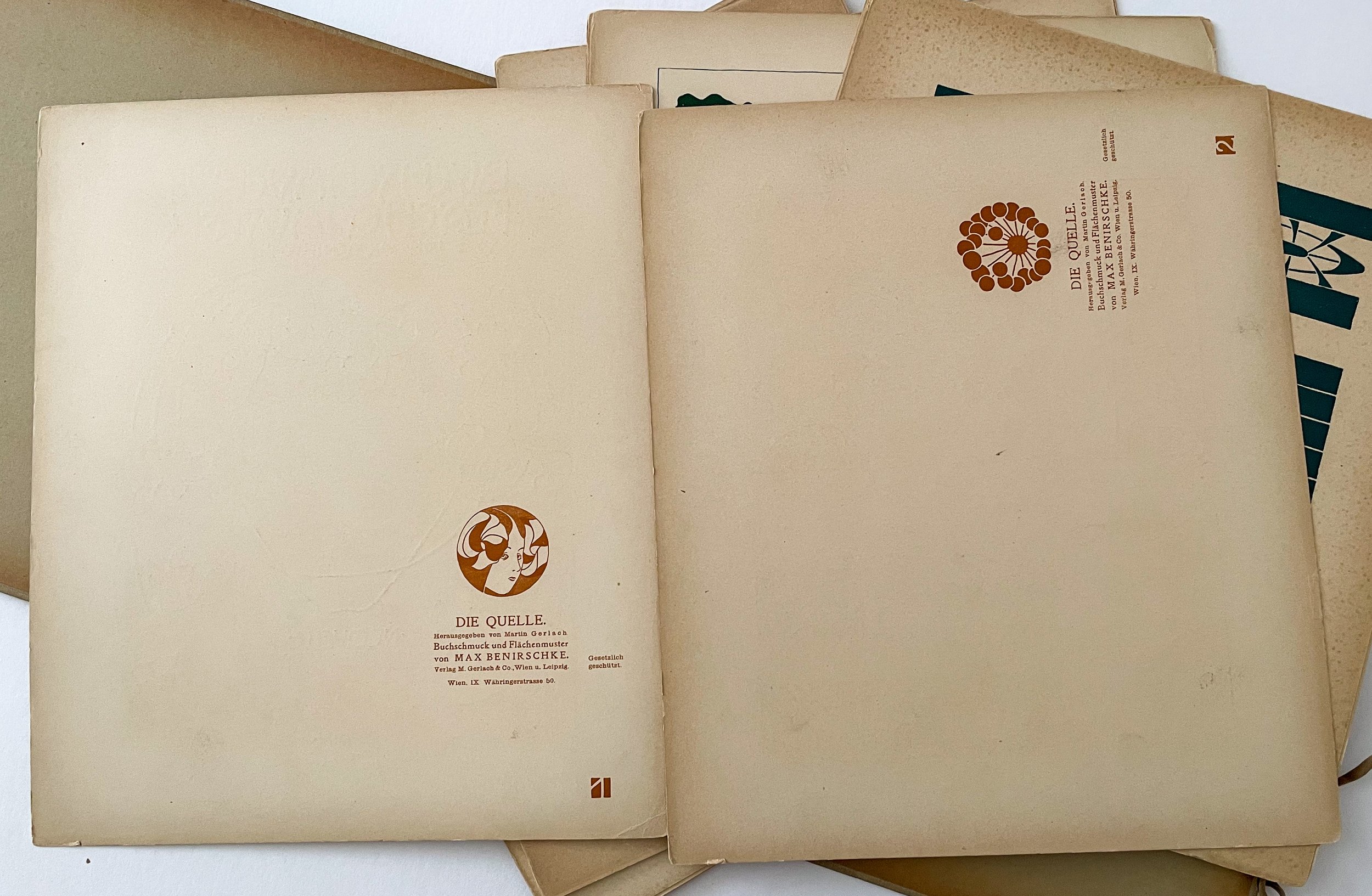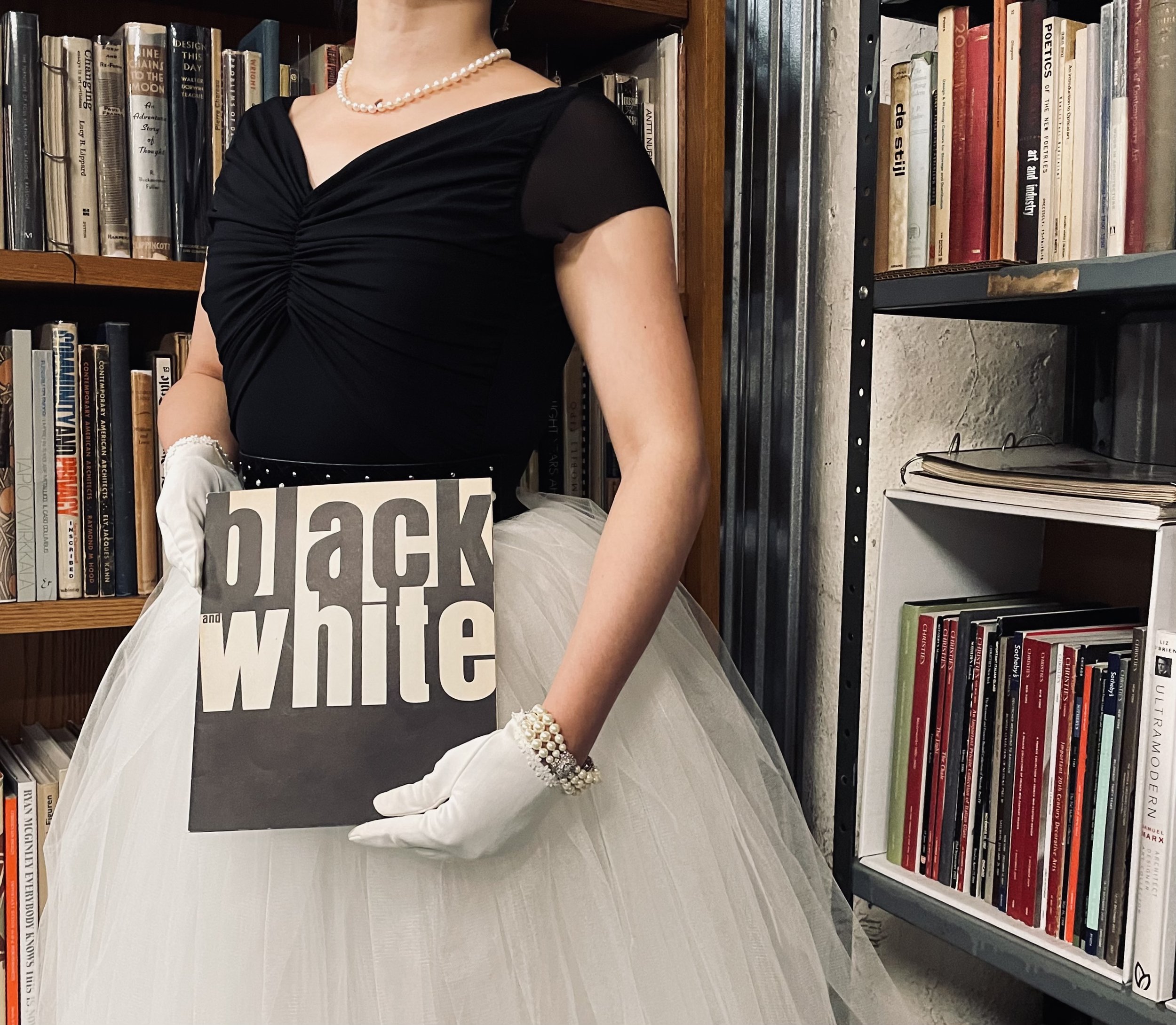 Image 1 of 9
Image 1 of 9

 Image 2 of 9
Image 2 of 9

 Image 3 of 9
Image 3 of 9

 Image 4 of 9
Image 4 of 9

 Image 5 of 9
Image 5 of 9

 Image 6 of 9
Image 6 of 9

 Image 7 of 9
Image 7 of 9

 Image 8 of 9
Image 8 of 9

 Image 9 of 9
Image 9 of 9










Buchschmuck Und Flachenmuster von Max Benirschke (Vol. 2 of Die Quelle)
First edition of the second volume (of three) of the renowned graphic design publication Die Quelle (the Source), deemed, along with the journal Die Flache, as among the finest examples of Secession-style graphic design. Published by M. Gerlach & Co of Vienna and Leipzig; not dated but circa 1902-1905. Buchschmuck und Flachenmuster translates to Book Decoration and Surface Design. It presents the work of Max Benirschke (1880-1961), an Austrian architect, illustrator, and designer who studied at the Kunstgewerbescule in Vienna under Josef Hoffmann and was subsequently hired by Peter Behrens in 1903 to teach at his newly founded School of Applied Arts in Dusseldorf. In 1900, Benirschke was enlisted by the famed Viennese publisher Martin Gerlach to produce a folio for Die Quelle; the result shows Benirschke “at the height of his Jugenstil period with a series of curvilinear plant motifs and patterns.” According to Austrian gallerist Michael Steinbach, the present volume is “one of the most important design portfolios of the Vienna Secession, a source book of design applicable to ceramics, textiles, silverware, and book design.” Complete, with 30 color lithographed plates printed in purple, green, orange and yellow, loose as issued in an illustrated quarter-cloth 4to portfolio (12” x 10”). Light bumping and soiling to extremities; paper hinges split, though binding still held strongly together by cloth; light rippling to cloth spine. Gentle bumping to leaves, otherwise pristine.
First edition of the second volume (of three) of the renowned graphic design publication Die Quelle (the Source), deemed, along with the journal Die Flache, as among the finest examples of Secession-style graphic design. Published by M. Gerlach & Co of Vienna and Leipzig; not dated but circa 1902-1905. Buchschmuck und Flachenmuster translates to Book Decoration and Surface Design. It presents the work of Max Benirschke (1880-1961), an Austrian architect, illustrator, and designer who studied at the Kunstgewerbescule in Vienna under Josef Hoffmann and was subsequently hired by Peter Behrens in 1903 to teach at his newly founded School of Applied Arts in Dusseldorf. In 1900, Benirschke was enlisted by the famed Viennese publisher Martin Gerlach to produce a folio for Die Quelle; the result shows Benirschke “at the height of his Jugenstil period with a series of curvilinear plant motifs and patterns.” According to Austrian gallerist Michael Steinbach, the present volume is “one of the most important design portfolios of the Vienna Secession, a source book of design applicable to ceramics, textiles, silverware, and book design.” Complete, with 30 color lithographed plates printed in purple, green, orange and yellow, loose as issued in an illustrated quarter-cloth 4to portfolio (12” x 10”). Light bumping and soiling to extremities; paper hinges split, though binding still held strongly together by cloth; light rippling to cloth spine. Gentle bumping to leaves, otherwise pristine.
First edition of the second volume (of three) of the renowned graphic design publication Die Quelle (the Source), deemed, along with the journal Die Flache, as among the finest examples of Secession-style graphic design. Published by M. Gerlach & Co of Vienna and Leipzig; not dated but circa 1902-1905. Buchschmuck und Flachenmuster translates to Book Decoration and Surface Design. It presents the work of Max Benirschke (1880-1961), an Austrian architect, illustrator, and designer who studied at the Kunstgewerbescule in Vienna under Josef Hoffmann and was subsequently hired by Peter Behrens in 1903 to teach at his newly founded School of Applied Arts in Dusseldorf. In 1900, Benirschke was enlisted by the famed Viennese publisher Martin Gerlach to produce a folio for Die Quelle; the result shows Benirschke “at the height of his Jugenstil period with a series of curvilinear plant motifs and patterns.” According to Austrian gallerist Michael Steinbach, the present volume is “one of the most important design portfolios of the Vienna Secession, a source book of design applicable to ceramics, textiles, silverware, and book design.” Complete, with 30 color lithographed plates printed in purple, green, orange and yellow, loose as issued in an illustrated quarter-cloth 4to portfolio (12” x 10”). Light bumping and soiling to extremities; paper hinges split, though binding still held strongly together by cloth; light rippling to cloth spine. Gentle bumping to leaves, otherwise pristine.
















